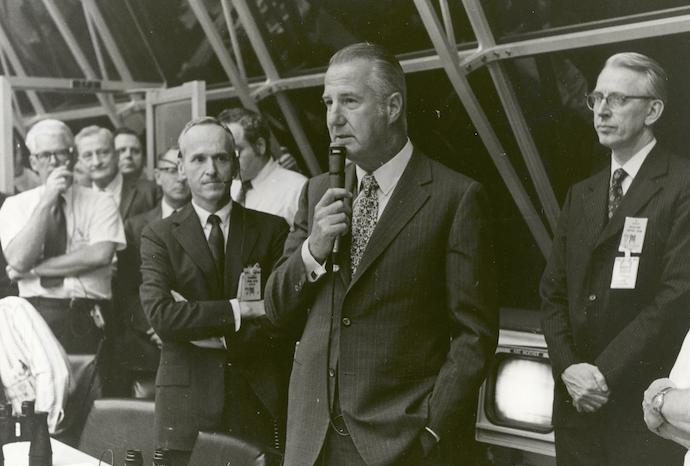As Baltimore’s riots raged in 1968 after the gruesome assassination of the Rev. Martin Luther King, Jr., Maryland Governor Spiro Agnew chastised Black leaders for failing to step forward to ramp down the violence. His remarks drew national attention and consequently his selection by Richard M. Nixon as his vice presidential running mate.
The politically shrewd and ruthless Nixon figured he had an attack dog in Agnew who would curry votes from the segregationist South.
Nixon had learned the tremendous appeal of anti-integration Alabama Gov. George Wallace, who was gaining momentum before he was seriously wounded in a Laurel, Md. shopping center parking lot while campaigning for the presidential nomination as an Independent.
Fast forward 55 years to Jan. 18, 2023, the day that Maryland inaugurated its first Black governor, Wes Moore, and its first immigrant as lieutenant governor, Aruna Miller. Agnew would be aghast, if not appalled.
He resigned as vice president in disgrace after being accused of taking payoffs as Baltimore County Executive and vice president. He gained prominence on the national stage for his stridently divisive remarks. He exited ignominiously wreaking of corruption. Maryland was blemished.
As I listened to Gov. Moore’s crisply delivered speech, I was struck by two themes: in addressing thorny socioeconomic issues, he eschewed either/or and the politically explosive me-against-them battleground. He expressed hope. He postulated that our state could be a leader in promoting equality, achievement and fairness.
For example, Moore opined there could be safe streets and fairer treatment of Black offenders imprisoned in disproportionately greater numbers than Whites.
Further, building Maryland’s wealth should be as equally compelling as attacking poverty and unequal health care. Moore will not forget Baltimore, a city infamous for its rampant crime and disparity between the wealthy and disadvantaged.
Raised in Baltimore, with continued family ties and dear friends, I bemoan its image of incessant drug abuse and gang-related violence. Gov. Moore seems determined to revive the once-upon greatness of a city that, though generally segregated during my upbringing, did not set records for violence.
Moore has talked frequently about service above self. He is recommending a gap year between high school graduation and college or job. Domestic service for youth is a constant topic of discussion in the political arena. In recent years, many advocates think that national service will knock down barriers between the rich and poor—and minimize polarization between social classes.
I hope that Moore will succeed ‘in leaving no one behind.’ I admire his military experience and his commitment to discipline, as well as loyalty to those whom he leads. He has served in a combat zone. He is accustomed to focusing laser-like on a mission and accomplishing it, noise and distractions aside.
He waved away skeptics during his inaugural remarks who might believe that his litany of objectives would fall victim to political strife and ideological roadblocks. He understands the challenges facing his administration. At this point, everything is possible—until it isn’t.
Moore realizes that his success as Maryland’s 63rd governor will depend on his staff, his cabinet secretaries, the legislature—and his ability to lead with clarity and credibility. Some of his appointees will serve him well, offering pragmatic creativity. Others will fall by the wayside, unable or unwilling to understand Maryland’s Byzantine political process. His priorities may suffer.
Moore’s charisma alone will not suffice. His persistence and trustworthiness will trump all. He should pay little or no attention to the national glare that will engulf him as our state’s first Black governor. He should direct his ambitions to our state and its needs.
Maryland comes first. He knows that. Flattery is illusory.
Spiro Agnew made enemies. He did little to calm the rioters in 1968. He opted for blame instead of collaboration. He unashamedly used political office for personal gain. He placed Maryland in the forefront of corruption. Five-and-a-half decades later, we have a governor who desperately seeks change to benefit the entire spectrum of citizens. His enemies will be those who view new thinking as threatening.
As a final note, I commend former Gov. Larry Hogan for his gracious handling of the transition between his and Moore’s administration. His civility, once a staple of politics, stood in sharp contrast to the handoff between Trump and Joe Biden. Hogan received special mention, deservedly so, from Moore during his inauguration remarks.



Gren Whitman says
Some of us still remember Spiro T. Agnew as the Republican who became Maryland’s governor in 1966 because he was perceived to be more “liberal” than the Democrats’ candidate, George P. “Your-Home-Is-Your-Castle-Protect-It” Mahoney.